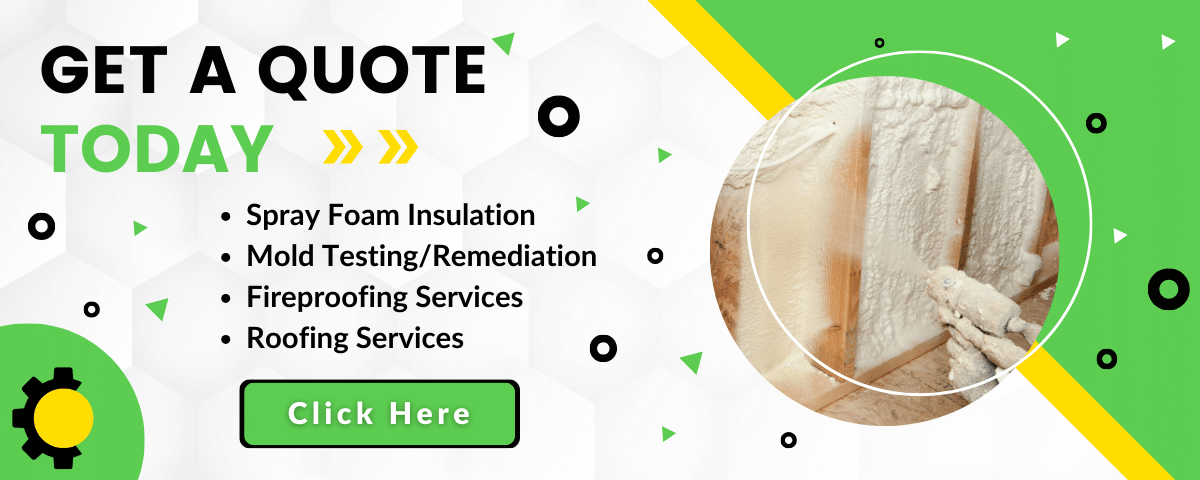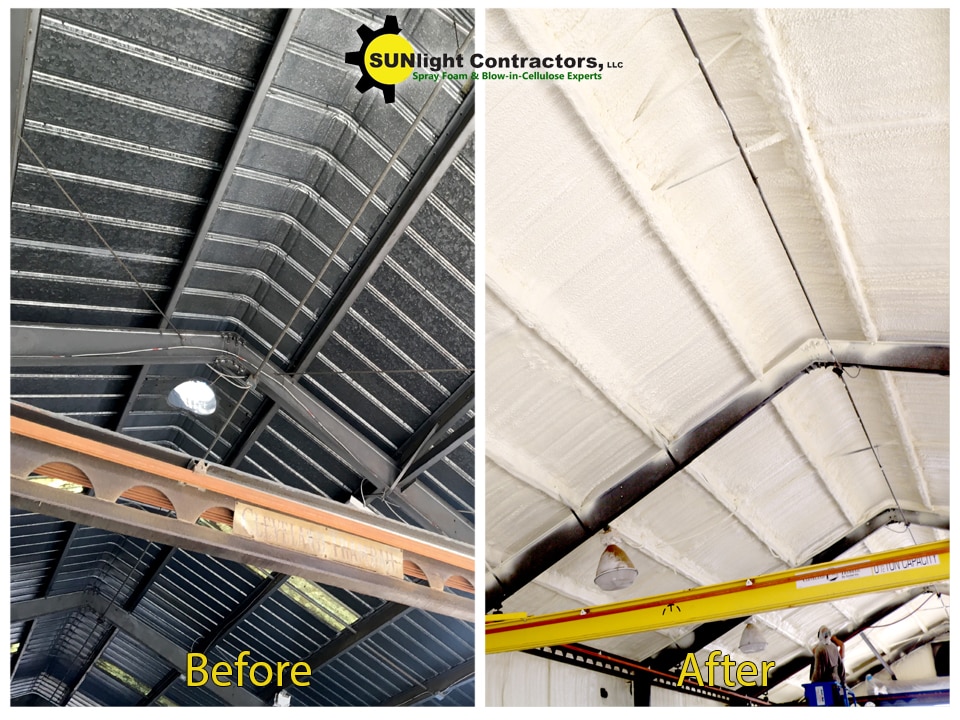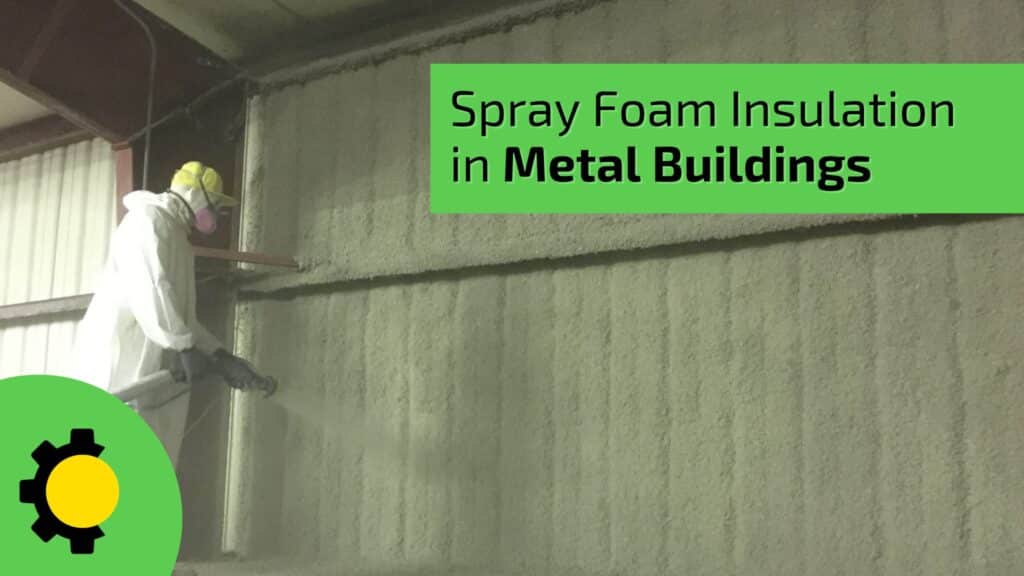You can improve metal building performance with closed-cell spray foam insulation. Closed-cell spray foam insulation offers a wide range of benefits for metal buildings, making it a smart investment for property owners seeking better energy efficiency, temperature control, noise reduction, and moisture protection. Its durability and long lifespan also make it a cost-effective solution for both commercial and residential metal structures.
What is Spray Foam Insulation?
Spray foam insulation is a high-performance material designed to block airflow through walls, ceilings, and floors. It creates an airtight seal around common leak points such as electrical outlets, light fixtures, and window or door frames. This makes it especially effective for maintaining indoor comfort and reducing energy loss.
While commonly used in new builds—including attics, crawl spaces, and rim joists—it can also be applied in existing structures like older homes, commercial spaces, and metal buildings, provided the installation areas are accessible. One of the key advantages of spray foam is its durability. Unlike traditional insulation, which can sag or compress over time, spray foam maintains its shape and insulation properties. It expands on contact, sealing even the smallest cracks and crevices for lasting performance.
There are two primary types of spray foam insulation: open-cell and closed-cell. Each type has its own set of features and applications.
Open-Cell Spray Foam
Open-cell spray foam contains deliberately unsealed air pockets, which give it a soft, flexible texture. This elasticity allows it to adapt to irregular surfaces and shifting structures, making it a practical choice for filling gaps around wiring, plumbing, and ductwork. It is most often applied during the early phases of construction to address hard-to-reach voids in walls, floors, and ceilings. While open-cell foam is effective for sound absorption and air sealing, it is less dense and less resistant to moisture than its closed-cell counterpart.
Closed-Cell Spray Foam
Closed-cell spray foam features a tightly packed structure, with its individual cells completely sealed off. This dense composition prevents the passage of both air and water, making it exceptionally strong and moisture-resistant. Its rigidity adds structural support to metal walls and roofs, reinforcing the building’s frame and improving overall stability.
For metal buildings, closed-cell foam is the top choice. It provides outstanding insulation performance, helps stabilize indoor temperatures year-round, reduces the risk of condensation buildup, and even dampens outside noise. The added rigidity also contributes to the structural strength of the building, making it particularly valuable in areas prone to severe weather or high winds.

Benefits of Closed-Cell Spray Foam Insulation in Metal Buildings
Closed-cell spray foam insulation offers a robust, long-term solution for insulating metal buildings. Its dense composition not only improves energy efficiency but also strengthens the structure, controls indoor temperature, and prevents moisture-related issues. For property owners seeking performance and durability, this insulation type delivers measurable results.
Strengthens the Structure and Increases Rigidity
One of the standout advantages of closed-cell spray foam is its high compressive strength. When applied to metal walls and roofs, it reinforces the overall structure. This additional layer of support helps resist damage from extreme weather events, including high winds and hail. The foam hardens after application, acting almost like a bonding agent that adds structural stability to metal surfaces, which can otherwise flex or vibrate under pressure.
Reduces Noise from Outside Sources
Closed-cell spray foam also serves as an effective sound barrier. Its dense, air-sealed structure helps to significantly lower noise transmission into the building. Whether your metal building is located near a busy road, a construction site, or in a high-traffic industrial area, this insulation helps maintain a quieter interior environment.
Maintains Comfortable Indoor Temperatures
Compared to traditional options like fiberglass or cellulose, closed-cell spray foam provides far superior thermal performance. Once applied, it forms a continuous, airtight barrier that keeps cooled air from escaping during the summer and retains heat in winter. This tight seal helps to stabilize indoor temperatures and reduce the workload on HVAC systems, ultimately lowering energy consumption and monthly utility bills.
Prevents Condensation and Moisture Issues
Moisture problems are a common concern in metal buildings. The airtight seal created by closed-cell foam minimizes the potential for condensation to form on walls and ceilings. By reducing the amount of moisture in the air, the insulation helps protect the interior from mold growth, mildew, and corrosion. Its durability and moisture-resistant properties make it especially useful in climates with high humidity or wide temperature swings.
Advantages of Closed-Cell Spray Foam in Metal Structures
- High R-Value
Closed-cell foam has a higher R-value per inch than most other insulation materials. This means it delivers more effective thermal resistance and helps keep heating and cooling costs low. - Quick and Straightforward Application
Spray foam is relatively easy to apply and can be installed faster than many traditional insulation types. While it’s best handled by professionals, the process is efficient and doesn’t require complex equipment on site. - Seals Gaps and Cracks Completely
The expanding nature of spray foam allows it to fill and seal tiny cracks, seams, and penetrations. This results in a continuous insulation layer with no weak points, significantly improving the building’s overall energy efficiency. - Improves Indoor Air Quality
Because it blocks outside air, closed-cell foam also limits the entry of dust, pollen, and airborne allergens. This contributes to cleaner indoor air, especially important for buildings used as workshops, warehouses, or living spaces.
Disadvantages to Consider
- Higher Initial Cost
Closed-cell spray foam generally costs more upfront compared to traditional insulation options. However, it delivers long-term savings by lowering energy usage and reducing maintenance. - Professional Installation is Often Required
Due to the specialized nature of the application, professional installers are typically needed. This can increase overall costs, especially in more complex or hard-to-access spaces. - Can Be Messy to Apply
The installation process can be somewhat messy. Overspray or excess material often needs to be manually trimmed or cleaned up after the foam has cured.

Spray Foam Insulation Costs for Metal Buildings
- Material and Installation Costs
On average, the installed cost of spray foam insulation ranges from $1.25 to $4.50 per square foot. The final cost depends on the thickness of the application and the specific insulation requirements of your building. - Size of the Area Matters
Larger buildings naturally cost more to insulate. The total square footage plays a major role in estimating the budget. - Thicker Application Means Higher Cost
If your insulation project requires multiple layers or thicker coverage for increased R-value, expect the price per square foot to increase accordingly. - Labor Costs Vary
Labor fees are influenced by the building’s layout, accessibility, and location. Typical labor rates range from $0.44 to $1.55 per square foot, and more intricate structures may push this higher.
Final Thoughts
Closed-cell spray foam insulation is one of the most reliable solutions for metal buildings. It not only enhances energy efficiency but also improves durability, comfort, and air quality. While the upfront cost may be higher than other options, its long-term benefits—like lower energy bills, reduced maintenance, and better structural integrity—make it a smart investment. Whether you’re upgrading an existing structure or planning a new build, closed-cell foam delivers protection and performance that lasts.

